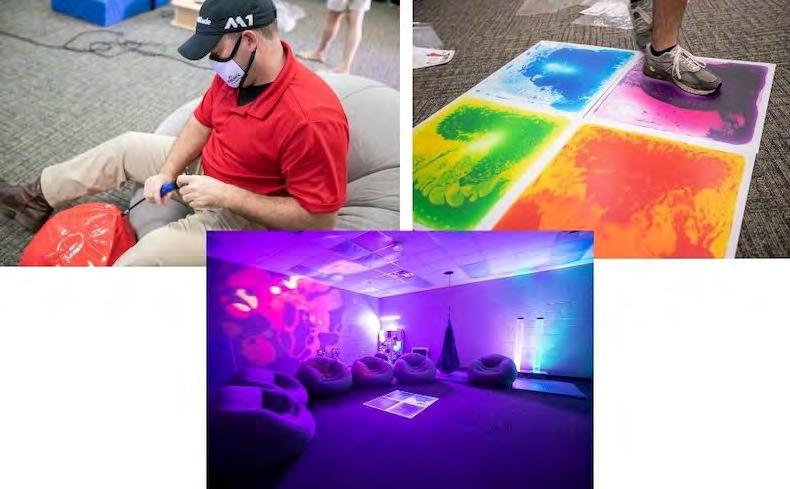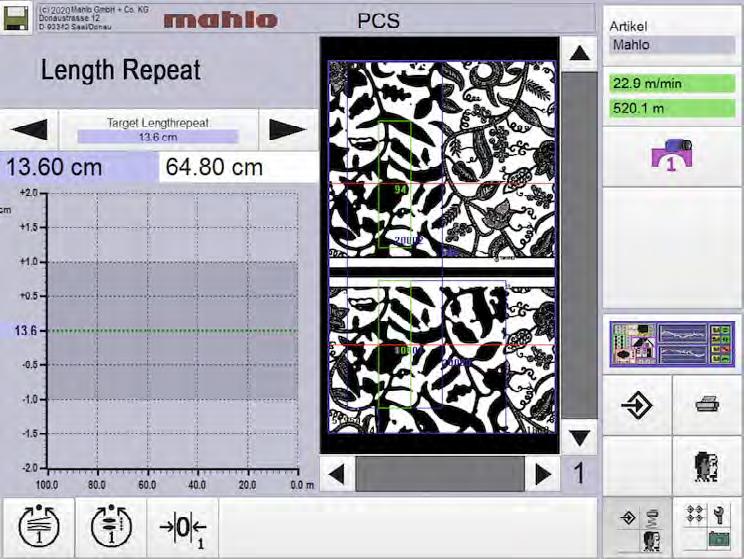
7 minute read
Learning Spaces
MOHAWK GROUP PROVIDES CARPET TO LEARNING SPACES
Each year, Mohawk Group partners with Georgia United Credit Union Foundation to “crash” deserving schools all over the state. Faculty and administration across Georgia apply for facility makeovers based on specific needs that would enhance their respective curriculum and campus. One winner receives a school makeover grant funded by the foundation and runner-up schools receive grants for specific projects.
Advertisement
Earlier in the summer, donations of carpet tile and adhesive were dispatched on the Mohawk fleet for School Crashers to refresh media centers at Avondale Elementary School in Avondale Estates and Booker T. Washington High School in Atlanta.
Additionally, Mohawk Group helped make a new sensory room a reality at New Hope Middle School, which sits just down the street from some of its manufacturing facilities in Dalton as the closest school crash to date.
“In these uncertain times, budget cuts and whatever else our future may possibly hold, a winning grant and the donation of carpet is so wonderful,” said Cami Baldivid, the New Hope Middle School teacher who submitted the award-winning application. “Our teachers of exceptional students and paraprofessionals are ecstatic about using this room with our students to meet their daily needs and challenges.”
The school used the $20,000 award to establish an inspiring and engaging environment specifically set aside for a population of nearly 30 students that have diverse academic needs that range from autism, intellectual disorders, physical impairments, visual impairments and oppositional defiant disorders.
Floor-to-ceiling upgrades have breathed new life into a formerly unused and outdated computer lab. The safe space will provide a designated area where these students can relax to calm and refocus themselves as they return to in-person instruction later this month.
“Georgia United is committed to improving the quality of life for children and families in our communities,” said Debbie Smith, president and CEO. “The School Crashers program is now in its seventh year and has provided 50 school makeovers totaling more than $1.5 million in improvements.
School Crashers unites the community, donor partners like Mohawk and volunteers with the goal of providing inspiring learning and play spaces for the students, at no cost to the school.”
The donation of carpet allowed the school to reallocate some of the budget to use on other items to fill and further build out the sensory room. In addition to providing the carpet, Mohawk also supplied some of its own volunteers who, while undertaking certain precautions, helped install flooring, paint, put together furniture and set up each of the rooms.
Four additional public schools across metropolitan Atlanta and middle Georgia were the deserving recipients of School Crashers program grants with the addition and makeover of playgrounds and outdoor classrooms.
“We look forward to this partnership every year because we understand the impact of environment on the educational experience,” said David Dembowitz, senior vice president of education and government for Mohawk Group. “By improving the look and feel of spaces at three schools this year, we know this will also improve their student experience and create pride, which studies show lead to higher test scores and better grades.”
TURKEY OFFERS AN OPPORTUNITY TO ACCESS GLOBAL MARKETS VIA FREE TRADE AGREEMENTS
Free Trade Agreements (FTAs) enable boosting trade and social relationships between two or more countries. Reducing duty expenses and trade barriers, they help address behind-the-border barriers, encourage investment, and improve the rules affecting issues such as intellectual property, e-commerce, and government procurement.
Involved in EU Customs Union since 1996, Turkey has been implementing its trade policy following the EU’s Common Commercial Policy and has FTAs in force with 20 countries now, which are the EFTA countries, Israel, Macedonia, Bosnia-Herzegovina, Palestine, Tunisia, Morocco, Syria, Egypt, Albania, Georgia, Montenegro, Serbia, Chile, Mauritius, South Korea, Malaysia, Moldova, Faroe Islands, and Singapore.
Besides, Turkey has started or been conducting negotiations with countries including Lebanon, Kosovo, Sudan, Qatar, Venezuela, Japan, Ukraine, Peru, Indonesia, Colombia, Ecuador, Mexico, Thailand, Pakistan, Democratic Republic of Congo, Djibouti, Cameroon, Chad, Seychelles, Gulf Cooperation Council, Libya, the MERCOSUR countries, USA, Canada, India, Vietnam, Central American countries, other ACP countries, Algeria, and South Africa.
Free trade activities in Turkey offer numerous advantages, which are:
- Free access to markets that foreign investors in Turkey may not reach before - Reducing of income tax from 33% to 20% and tax benefits/incentives in Technology Development Zones, - Industrial Zones, and Free Zones which could result in total or partial exemption from Corporate Income - Tax, a grant on employer’s social security share, as well as land allocation - Turkey’s FTA partners with a share of 9.5% in export markets and a share of 4.5% in Turkey’s imports with a trade surplus of 3.9 billion dollars - Turkey as a desirable country for foreign investors for production and exportation, a production base for electronics, nutriment, chemistry, durable consumer goods with its advantageous location and easy access to its neighbor countries via land transportation - Qualities of improving efficiency and innovation, driving competitiveness and promoting fairness

Some novelties will be introduced with the next generation of the pattern control system.
Large, artistic graphics, timeless glen check or exact pinstripes – the choice of patterns for textiles knows no limits. More and more sophisticated materials are being used to this end, varying greatly in density or elasticity.
This presents an increasing challenge for textile manufacturers to produce straight weft and straightened pat-terns. Here, the alignment according to the design often plays a greater role than the weft insertion. The German company Mahlo GmbH + Co KG solves this problem with its improved Patcontrol PCS-20 system for pattern recognition and warp control.
To ensure that customers receive the quality they want in patterned goods, textile manufacturers must adhere to the tightest tolerances in terms of parameters such as pattern repeat or pattern distortion. After all, nobody would accept distorted patterns in carpets, textile printing, woven goods and knitwear,
For large-area carpets, patterns have to match exactly
The Patcontrol PCS straightens bow and skew distortions in technical textiles just as reliably as in terry cloth, e.g. towels, printed clothing fab-rics or flocked articles. Even goods that cannot be detected with conven-tional scanning systems, such as lace and rustle curtains or mesh fabrics used for example in sports shoes, do not pose a problem for pattern recognition.
For years Mahlo has been providing reliable support for textile manufacturers with the Patcontrol PCS. The new version PCS-20 now facilitates the production process even more.
Camera and lighting technology further developed
The system uses camera technology to detect the position of the pattern and automatically and continuously determines the pattern repeat, measures the product width, and – together with a straightener – straight-ens the product distortion based on the print pattern.
New long-life LED lighting generates the maximum brightness on the market, thereby extending the scanning range for darker goods. Improved cameras allow brightness control by gain and exposure time. With the Generation 20 system, more than two cameras can also be connected per measuring point.
This allows a higher resolution and an even more accurate result to be achieved. A Gigabit connection allows the transmission of large amounts of data. Using a mounting aid, the exact camera adjustment can be done easily and quickly. A compact interface box at the measuring point integrates the Patcontrol PCS-20 even more easily into the existing plant.
As with all current Mahlo systems, pattern recognition is also integrated into the mSmart digitisation concept. Mahlo-Regulating textile patterns with new Patcontrol PCS-20 • Gigabit connection • Easy camera adjustment

Users, machines and processes are networked with each other and meet all the requirements of Industry 4.0.
Area of application
• Straightening of curtain and lace fabric as well as repeat measurement and control of the feed roller • Straightening of woven and tufted carpets before a coating process • Straightening of terry cloth (e.g. towels) • Fine straightening of printed goods • Report detection and sorting • Continuous width measurement ciency and profit. Its use brings com
• Logging of repeat and warp on carpets • Residual distortion straightening of carpets at the stenter frame outlet • Special evaluations and measurements on technical textiles
Advantages of the new generationPatcontrol PCS-20
• Higher resolution – more than 2 cameras per measuring point possible • Brightness control • CMOS technology New LED lighting • Larger scanning range through maximum brightness on the market • Longer service life
Easy integration through compact interface box Current Windows 10 operating system
The Patcontrol PCS-20 ensures the textile manufacturer complete monitoring and logging of the actual product quality. The new generation of Patcontrol thus makes an important contribution to increasing quality, effiNew camera technology
panies even closer to 100% ‘Right First Time’.

90days promotion
7/24Support: Whatsapp/Wechat : +905392346324 info@kohanjournal.com www.kohantextilejournal.com







